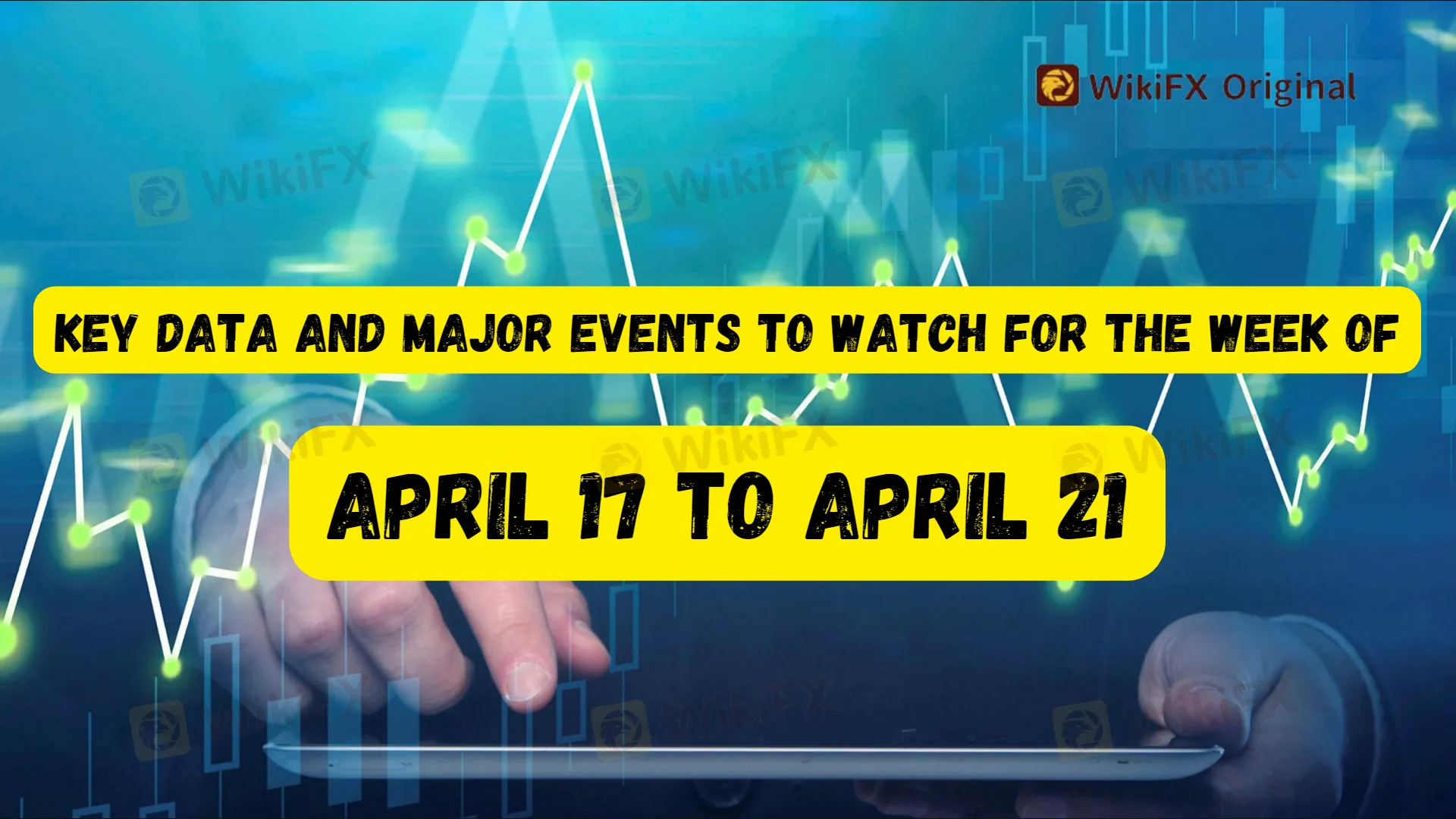简体中文
繁體中文
English
Pусский
日本語
ภาษาไทย
Tiếng Việt
Bahasa Indonesia
Español
हिन्दी
Filippiiniläinen
Français
Deutsch
Português
Türkçe
한국어
العربية
Key data and major events to watch for the week of April 17 to April 21
Abstract:Key data and major events to watch for the week of April 17 to April 21

Investors need to pay attention to key data during the week of April 17 to April 21, including Germany's Q1 seasonally adjusted GDP, Eurozone ZEW Economic Sentiment Index for April, US API and EIA crude oil inventory changes as of April 14, US initial jobless claims as of April 15, and Japan's CPI for March. Major events to watch during the week include the release of the April Monetary Policy Meeting Minutes by the Reserve Bank of Australia and speeches by Federal Reserve officials such as New York Fed President Williams and Cleveland Fed President Mester.
① Key event on April 17th (Monday): Germany's Q1 seasonally adjusted GDP growth rate

Germany's Q4 seasonally adjusted GDP growth rate was revised to -0.4%, lower than the expected -0.2%. Private consumption, which supports economic growth, was hit by high inflation in Q4. Adjusted for price, seasonality, and calendar effects, construction investment continued to decline, and corporate investment in equipment such as machinery, equipment, and vehicles also fell.
On April 17th, Germany will release the Q1 seasonally adjusted GDP growth rate, which is expected to continue to disappoint.
② Key events on April 18th (Tuesday): Eurozone's ZEW economic sentiment index for April, release of minutes from April monetary policy meeting of the Reserve Bank of Australia

Eurozone's ZEW economic sentiment index for March was 10, lower than the previous value of 29.7. Germany's ZEW economic sentiment index for March was 13, lower than the expected 17.1 and the previous value of 28.1.
On April 18th, Eurozone will release the ZEW economic sentiment index for April, which may record a further decline.
On April 4th at 12:30 Malaysia time, the Reserve Bank of Australia (RBA) paused its rate hike and maintained the policy rate at 3.6%, marking the first major developed country central bank to pause its rate hike since the banking crisis.
On April 18th, the RBA will release the minutes from its April monetary policy meeting, which will provide investors with more insight into the thoughts of RBA officials.
③ April 19th (Wednesday) Keywords: Weekly API and EIA Crude Oil Inventory Changes as of April 14th

The American Petroleum Institute (API) reported a slight increase in crude oil inventories last week. As of April 7th, the API reported a crude oil inventory change of 37.7 million barrels, higher than the expected -1.3 million barrels and previous -4.346 million barrels. As of March 31st, the Energy Information Administration (EIA) reported a crude oil inventory change of -37.39 million barrels, lower than the expected -23.29 million barrels and previous -74.89 million barrels.
On April 19th, the US will release the weekly API and EIA crude oil inventory changes as of April 14th, which investors need to pay attention to.
④April 20th (Thursday) Keywords: Initial Jobless Claims as of April 15th and New York Fed President Williams

The US reported 239,000 initial jobless claims for the week ending April 8th, slightly higher than the previous and expected values, indicating a loosening labor market. On April 10th, the US will release the initial jobless claims as of April 15th, which may continue to increase.
New York Fed President John Williams stated on April 11th that Fed officials still have more work to do to lower inflation, echoing recent comments by his colleagues. Williams said that despite the new uncertainty brought about by the banking crisis, they will stick to this policy. He said that raising interest rates one more time this year and then pausing is reasonable.
On April 20th, the Fed will release the Beige Book, which provides information on the US economy, and New York Fed President Williams will deliver a speech, along with a speech by Fed Board Governor Lael Brainard, which investors need to take seriously.
⑤ April 21st (Wednesday) Keywords: Japan's CPI in March, Raphael Bostic Fed President Mester

In February, Japan's core consumer price index (excluding fresh food prices) increased by 3.1% year-on-year, which met market expectations but significantly slowed from January's 4.2% increase. It was the first time in 13 months that core inflation in Japan had slowed, indicating that the energy subsidies introduced by the Japanese government had started to take effect.
However, another key inflation indicator, the core-core CPI (which excludes fresh food and energy prices), increased by 3.5% year-on-year, higher than January's 3.2%, reaching a 41-year high, indicating that inflation pressure still exists.
Masamichi Adachi, chief Japan economist at UBS, said, “The core-core CPI does look stronger than expected. What didn't happen last year, the passthrough (from wholesale prices to consumer prices), is happening now.”
In April, the Bank of Japan will experience a change of leadership for the first time in 10 years. In the case of inflation's stickiness exceeding expectations, the challenge for the new Governor, Haruhiko Kuroda, in monetary policy will increase.
On April 21st, Japan will release its CPI data for March, which is expected to show little change.
On April 6th, Loretta Mester Fed President Mester said that she expects the Federal Reserve to have to further raise interest rates to reduce inflation. Raphael Bostic had said that he expects the Fed to pause raising interest rates in the middle to latter part of the summer.
On April 21st, Mester will give a speech on the economic and monetary policy outlook, while Barkin will give a speech on the economic situation. Investors should also pay attention to the development of the global pandemic and the situation in Ukraine, which may have some impact on the financial markets.
WikiFX is a leading platform that provides users with comprehensive information about forex brokers, including their regulatory status, trading conditions, and customer reviews, among other details. By accessing this information, users can make informed decisions when selecting a forex broker and reduce their risk of falling victim to a forex broker that is bound for an upcoming collapse.

Disclaimer:
The views in this article only represent the author's personal views, and do not constitute investment advice on this platform. This platform does not guarantee the accuracy, completeness and timeliness of the information in the article, and will not be liable for any loss caused by the use of or reliance on the information in the article.
Read more

Exposed: Deceptive World of Fake Trading Gurus – Don’t Get Fooled!
The internet is inundated with advertisements and promotions from self-proclaimed trading gurus who promise to teach you how to become a successful trader and earn a substantial secondary income. These individuals often claim that their trading techniques can make you rich, even if you have zero experience. However, these assertions are typically false, and many people fall victim to these scams. This article aims to expose these fake trading gurus, explain how they operate, and provide tips on how to avoid being scammed.

Navigating the Intersection of Forex Markets, AI Technology, and Fintech
The financial world is transforming, driven by the rapid integration of artificial intelligence (AI) and innovative fintech solutions. This change is most apparent in forex markets, where algorithmic trading and deep learning are redefining strategies, risk management, and decision-making. In this article, we explore how AI-driven technologies are not only revolutionizing forex trading but are also propelling fintech innovations that enhance customer experiences, bolster security, and unlock new market opportunities.

The One Fear That’s Costing You More Than Just Profits
The fear of missing out (FOMO) is NOT what you think it is! Read the three lesser-discussed components that contribute greatly to FOMO trading!

Why More People Are Trading Online Today?
Discover why online trading is booming with tech, AI, and a push for financial freedom. From stocks to crypto, it’s a thrilling hustle for all.
WikiFX Broker
Latest News
How Crypto Trading Transforms FX and CFD Brokerage Industry
UK would not hesitate to retaliate against US tariffs - No 10 sources
Navigating the Intersection of Forex Markets, AI Technology, and Fintech
Exposed: Deceptive World of Fake Trading Gurus – Don’t Get Fooled!
The One Fear That’s Costing You More Than Just Profits
Currency Calculator







